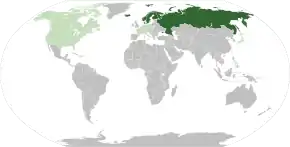Barents Euro-Arctic Council
Barents Euro-Arctic Council (BEAC) is the forum for intergovernmental cooperation on issues concerning the Barents region.[1][2] The meeting of the BEAC on the foreign ministers level are held every 2 years in the chairmanship country at the end of each BEAC chairmanship term. Between the ministerial meetings, the committee of senior officials organizes the work of BEAC.[3]
The International Barents Secretariat, situated in Kirkenes, Norway, is to support the multilateral activities within the Barents Euro-Arctic Council and the Barents Regional Council.
History
BEAC was founded at the conference on cooperation in the Barents Euro-Arctic Region took place in Kirkenes (Norway) on 11 January 1993 in accordance with the Kirkenes Declaration of 1993. The Ministers of Foreign Affairs or representatives of Denmark, Finland, Iceland, Norway, the Russian Federation, Sweden and the Commission of the European Communities participated in the conference, which was also attended by observers from the United States of America, Canada, France, Germany, Japan, Poland, and the United Kingdom. The BEAC was created in order to provide impetus to existing cooperation and consider new initiatives and proposals. The objective of the work of the council is to promote sustainable development in the Barents region, bearing in mind the principles and recommendations set out in the Rio Declaration and Agenda 21 of UNCED.[4]
Members

- Denmark
- Finland
- Iceland
- Norway
- Russia
- Sweden
- European Commission
Observers to BEAC
- Canada
- France
- Germany
- Italy
- Japan
- Netherlands
- Poland
- United Kingdom
- United States of America
Chairmanship
The BEAC Chairmanship [5] rotates every second year between Norway, Finland, Russia and Sweden. Usually, every Chair country has own priorities and plans of development.
- Norway is holding Chairmanship for the period 2019-2021[6]
- Sweden held the Chairmanship for the period 2017-2019[7]
- Russia held the Chairmanship for the period 2015-2017[8]
- Finland held the Chairmanship for the period 2013-2015[9]
- Norway held the Chairmanship for the period 2011-2013[10]
- Sweden held the Chairmanship for the period 2009-2011[11]
- Russia held the Chairmanship for the period 2007-2009[12]
Ministerial meetings
Ministers of the four Barents countries (Norway, Sweden, Finland, Russia) have met regularly since the Kirkenes Declaration in 1993. The BEAC Foreign Minister's Sessions is the highest decision-making body in the whole Barents cooperation.[13] Foreign ministers meet biannually with the transferring the BEAC Chairmanship to the next country.
Committee of senior officials
The Committee of Senior Officials (CSO) is the BEAC body responsible for coordinating the cooperation activities and organizing the work within BEAC between the meetings at the Foreign Minister level.[14] The CSO is represented by the civil servants from the governments of the member states and the European Union. Representatives of the observer countries have the right to participate. The CSO meets on a regular basis 4-5 times per year in the country holding the Chairmanship of the BEAC. The Chairperson of the CSO is a representative of the government of the Chair country.
Working groups
There is a number of the working groups assisting the cooperation and CSO. The working groups report to the CSO each year and the CSO gives guidance to the groups. The CSO has the mandate to establish new Working Groups or terminate groups that have completed their task.
List of the BEAC Working Groups:
- Working Group on Economic Cooperation
- Barents Forest Sector Network
- Working Group on Environment (subgroups: Hot Spots Exclusion, Nature Protection and Water Issues, Cleaner Production and Environmentally Sound Consumption)
- Joint Committee on Rescue Cooperation
- Steering Committee for the Barents Euro-Arctic Transport Area
See also
References
- "Finland halfway through its Barents Euro-Arctic Council Chairmanship". finland.se. Embassy of Finland, Stockholm; Finland's Honorary Consulate General, Gothenburg.
- "European Commission support for the Barents Euro-Arctic Council". cordis.europa.eu. Publications Office of the European Union.
- "Barents Euro-Arctic Council - Beac". www.barentscooperation.org. Archived from the original on 2018-04-29. Retrieved 2018-10-31.
- "Kirkenes Declaration 1993" (PDF). Archived (PDF) from the original on 2017-06-30.
- "Chair State of the Barents Euro-Arctic Council - Beac". www.barentscooperation.org. Archived from the original on 2018-03-22. Retrieved 2018-10-31.
- "Norwegian Chairmanship program 2019-2021" (PDF).
- "Swedish Chairmanship program 2017-2019" (PDF).
- "Russian Chairmanship priorities 2015-2017" (PDF).
- "Finnish BEAC Chairmanship program" (PDF).
- "Norwegian Chairmanship priorities 2011-2013" (PDF). Archived (PDF) from the original on 2018-03-15.
- "Swedish Chairmanship Programme 2009-11" (PDF).
- "Program of the Russian Charmanship in the Barents Euro-Arctic Council 2007 - 2009" (PDF).
- "Ministerial Meetings - Beac". www.barentscooperation.org. Archived from the original on 2018-04-30. Retrieved 2018-10-31.
- "Committee of Senior Officials - Beac". www.barentscooperation.org. Archived from the original on 2018-03-11. Retrieved 2018-10-31.
- "Swedish Chairmanship of the Barents Euro-Arctic Council 2017-2019: Regional Sustainable Development for the Future". swemfa.se. Government Offices of Swedish Ministry for Foreign Affairs. 20 October 2017. Archived from the original on 2017-11-22. Retrieved 2018-11-01.
- "The Barents Euro-Arctic Council". eib.org. European Investment Bank.
- "CBSS at the XVI Ministerial Meeting of the Barents Euro-Arctic Council (BEAC)". cbss.org. Council of the Baltic Sea States. Archived from the original on 2018-05-16. Retrieved 2018-11-01.
- "THE FINNISH CHAIRMANSHIP IN THE BARENTS EURO-ARCTIC COUNCIL 2013-2015". oaarchive.arctic-council.org. Arctic Council.
- "JOINT DECLARATION XVI SESSION OF THE BARENTS EURO-ARCTIC COUNCIL Arkhangelsk, 18-19 October 2017". mid.ru. The Ministry of Foreign Affairs of the Russian Federation.
- "The Arctic Council and the Barents Region: Mutually Reinforcing Partners". worldpolicy.org. WORLD POLICY INSTITUTE.